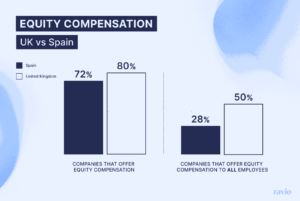Attracting and retaining top talent is a constant challenge in the fast-paced world of startups. While competitive salaries and attractive benefits are essential, forward-thinking companies are increasingly turning to equity compensation as a strategic tool for employee retention.
In this article, we’ll examine equity compensation, its role in fostering long-term commitment among employees, and the significance of equity refresher grants in keeping the momentum alive.
Equity compensation: Beyond the paycheck
Equity compensation, often in the form of stock options or grants, goes beyond the traditional salary structure. Stock options give the holder the right to buy shares at a predetermined price, while stock grants provide outright ownership of shares without the need for purchase. As the company’s valuation increases annually, the value of this equity multiplies, and possessing a share in the business could evolve into a significant financial asset for the employee down the line.
Equity compensation also aligns employees’ interests with the company’s success, transforming them into stakeholders with a vested interest in its growth. This motivates employees to contribute their best and encourages a sense of ownership and loyalty.
But is it common for companies to offer equity compensation to employees? It actually varies quite a bit across countries.
As an example, Ravio’s equity benchmarking dataset for European tech shows us that in the UK, 80% of companies do offer equity compensation to their employees. Within this figure, 50% of companies offer equity to all employees, whereas the rest only provide equity to select roles.
In Spain, it’s slightly less common to receive equity compensation as an employee, with 72% of companies offering equity compensation – and only 28% providing equity to all employees.

A major challenge when setting up an equity compensation scheme is that there are many different ways to approach granting employees equity – from the vehicle used to the vesting schedule to how much equity each employee gets.
Our partner Ravio can easily make equity compensation a differentiator for hiring and retaining top talent, with reliable benchmarking data and a clear view of current market trends.
Why equity matters in startups
1. Shared success
When employees feel they have a stake in the company’s success, they are more likely to go above and beyond their job descriptions, especially if it means earning extra income on top of their salary. This shared success mindset creates a culture of collaboration and collective achievement, which is essential for startups navigating growth challenges.

Equity compensation is also a performance-driven incentive. Employees understand that their efforts directly impact the value of their equity holdings, creating a results-oriented work environment where high performance is rewarded. The monthly vesting of share options incentivises team members to strive towards their objectives.
2. Employee attraction and retention
Attracting and retaining top talent is crucial in a competitive job market. Equity compensation is a powerful magnet, drawing in skilled professionals who see the potential for personal and financial growth tied to the company’s success.
Additionally, equity compensation establishes a lasting connection by giving employees a personal stake in the company’s expansion, increasing the likelihood that they will remain dedicated through challenges and successes. This can also contribute to a positive workplace culture and enhance overall job satisfaction, resulting in lower turnover. Currently, the UK experiences one of the highest rates in Europe for employees leaving their jobs, with an average annual employee turnover rate of 16.8%.
3. Long-term commitment
Startups thrive on stability and continuity. Equity compensation encourages employees to think long-term, fostering a commitment to the company’s journey rather than viewing their role as a mere stepping stone.
The role of equity refresher grants
Equity refresher grants play a pivotal role in maintaining the enthusiasm and commitment of employees over time. These grants, additional equity offerings provided at specific intervals, act as a powerful retention tool. Here’s why they matter:
1. Recognition of contribution
Equity refresher grants are a tangible acknowledgement of an employee’s ongoing engagement. They reaffirm their value to the company and motivate them to continue their dedicated efforts.
2. Adaptability to market change
The startup landscape is dynamic, and market conditions can shift rapidly. Equity refresher grants allow companies to recalibrate and stay competitive, ensuring the equity package remains attractive and relevant in changing economic environments.
3. Reducing the risk of employees leaving
Employees who accumulate experience and skills become more attractive to competitors. Equity refresher grants act as a preemptive measure against talent poaching, reinforcing the employee’s commitment to the company through continued equity participation.
Accelerating startup growth through equity compensation
When implemented strategically, equity compensation can be a game-changer for startups looking to build a resilient and motivated workforce. By aligning employees’ interests with the company’s success and incorporating equity refresher grants, startups can create a culture of long-term commitment and shared success, laying the foundation for sustainable growth in a competitive landscape.


